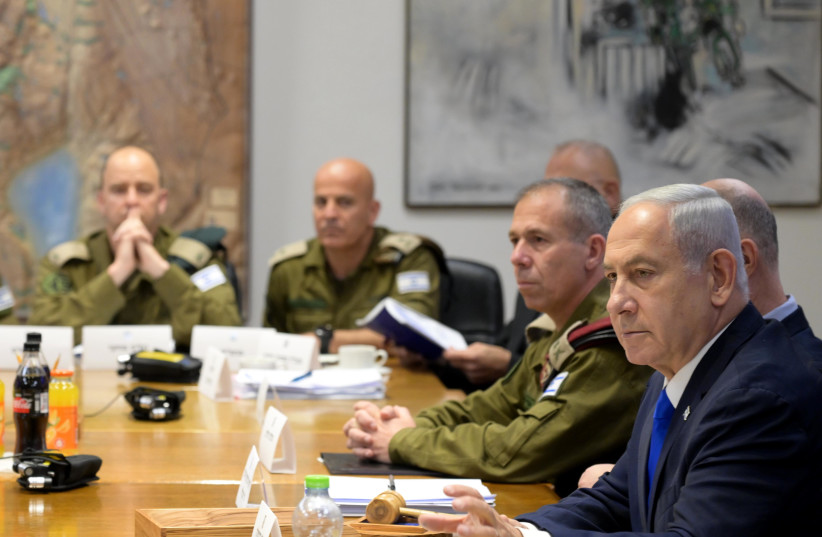Hours after the Israeli Air Force struck in the Gaza Strip killing three Palestinian Islamic Jihad (PIJ) commanders early Tuesday, tension in the country was running high as citizens braced themselves for retaliation. The Israeli Home Front Command ordered schools, beaches, and several highways in cities and towns in southern Israel to remain closed on Wednesday, also limiting public gatherings.
For more stories from The Media Line go to themedialine.org
The Israeli offensive on Gaza came a week after PIJ operatives fired over 100 rockets toward Israel in a single day. The barrage came after a senior PIJ member from the West Bank died in an Israeli prison on the 86th day of a hunger strike. Israel’s immediate response was seen by many as being lackluster, eliciting criticism from members of the governing coalition who had expected the right-wing government to display a stronger show of force.
At the height of the spiraling tensions, a summit held in Jerusalem by the Israel Defense and Security Forum (IDSF), attended by former senior defense officials, also hosted Prime Minister Benjamin Netanyahu via video conference.
The many speakers at the conference, with Netanyahu at the helm, pointed at Iran as Israel’s greatest and most imminent threat.
“Ninety-five percent of our problems stem from the zealot regime in Iran—their nuclear plan, their precision missiles, and their aggressive terror ring.”
Benjamin Netanyahu
“Ninety-five percent of our problems stem from the zealot regime in Iran—their nuclear plan, their precision missiles, and their aggressive terror ring,” said Netanyahu, who spoke briefly to the forum between security consultations.

Israel is surrounded by Iranian proxies on its borders. Hamas and the Islamic Jihad in the Gaza Strip, Hezbollah in Lebanon, and militias in Syria are all funded by Iran and focus on threatening Israel.
“My policy is to stall Iran’s nuclear capabilities as much as possible; so far I have stalled them but not prevented it,” Netanyahu continued. “Iran must also be prevented from opening a multi-arena campaign against Israel.”
Israel is facing a pivotal moment
According to Brig.-Gen. (res.) Amir Avivi, founder of the IDSF, Israel is facing a pivotal moment.
“The threats are not new, but they have developed dramatically in the past two decades and they are reaching a climax,” Avivi told The Media Line. “Israel might have to deal with the Iranian nuclear program. This will mean an Israeli attack on Iran which will probably result in a regional war.”
Israeli officials, with Netanyahu in charge, have repeatedly warned that Israel may act alone against Iran. In recent years, Israel has been looking to the United States for support on the Iranian issue. It will be difficult for the Jewish state to operate against the Islamic Republic without American military and diplomatic support.
Nevertheless, the US is increasingly perceived as withdrawing from the region.
“America doesn’t seem present enough in the Middle East,” said Avivi. “The overall situation is not very good.”
Or Yissachar is the head of the research department at the IDSF.
“Israel would love to act in coordination with the United States, but everybody has to understand that we will defend ourselves by ourselves,” he told The Media Line.
“The nuclear weapon would be the umbrella for all Iranian malign activity in the region,” Yissachar explained.
Head of the Shin Bet (Israel Security Agency) Ronen Bar told Israelis they “must understand” that Iran is the sole backer of the PIJ which was targeted by the Israeli air force earlier. Bar spoke at a press conference after the Israeli Security Cabinet met in a special session in Tel Aviv on Tuesday night.
Also attending the IDSF conference was controversial National Security Minister Itamar Ben-Gvir. A hardliner who has repeatedly called for a tougher hand towards the Palestinians, he was satisfied with Israel’s surprise attack on Gaza.
“I hope this trend will continue,” he told the attendees. “We need to be on the offensive, take initiative, seek engagement, and not to contain and be restrained. Restraint is not strength.”
Such targeted killings as Israel conducted in the overnight air raid have become increasingly rare in recent years. Palestinian health officials said thirteen civilians were also killed in the attack. Palestinian organizations vowed revenge.
“Initiatives, offensives, and targeted killings—that is the name of the game in the Middle East,” said Ben-Gvir.
The overnight Israeli offensive in Gaza comes after months of increased tensions between Israelis and Palestinians. Escalating violence in the West Bank has resulted in the killing of over 100 Palestinians by Israeli forces since the beginning of the year, many of whom were killed in daily raids conducted by the Israeli military in an attempt to stop a string of attacks on Israelis. PIJ members have been some of the main targets of these raids.
Israelis are now bracing themselves for a renewed round of violence in the coming days. With Iran in the background, the current cycle could spiral out of control.
